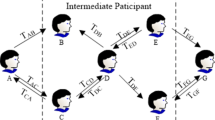Abstract
While social games based on geo-location are gaining popularity, determining the authenticity of the players’ geo-position becomes a challenge, since there are ways to counterfeit it, quite accessible to everyone. We propose a solution based on global spatial and temporal observation of the players’ interactions. In this paper we present TrustPos, a trust engine model that associates a trustworthiness factor to each player based on the context of the interactions with both the game and other players. The novelty of TrustPos is the fact that our model is based on an internal network of players linked through their interactions, as opposed to previous approaches that are strongly specialized to concrete domains as peer-to-peer networks and social recommenders, not adaptable to location trust concerns.
Access this chapter
Tax calculation will be finalised at checkout
Purchases are for personal use only
Preview
Unable to display preview. Download preview PDF.
Similar content being viewed by others
References
Foursquare, https://foursquare.com/about (accessed on May 2013)
Ingress. The game. NianticLabs@Google, http://www.ingress.com (accessed on May 2013)
Ingress mock your location, http://decodeingress.me/2012/11/23/ingress-chea-mock-your-location (accessed on May 2013)
Deriaz, M., Seigneur, J.-M.: Trust and Security in Spatial Messaging: FoxyTag, the Speed Camera Case Study. In: Proceedings of the 3rd International Conference on Privacy, Security and Trust. ACM (2006)
Deriaz, M.: Trust without Truth. In: Etalle, S., Marsch, S. (eds.) Trust Management. IFIP, vol. 238, pp. 31–45. Springer, Boston (2007)
Lenders, V., Koukoumidis, E., Zhang, P., Martonosi, M.: Location-based Trust for Mobile User-generated Content: Applications, Challenges and Implementations. In: Proc. HotMobile 2008 (2008)
Saroiu, S., Wolman, A.: Enabling new mobile applications with location proofs. In: Proc. HotMobile 2009 (2009)
Luo, W., Hengartner, U.: VeriPlace: A Privacy-Aware Location Proof Architecture. In: Proc. of ACM SIGSPATIAL GIS (2010)
Gilbert, P., Cox, L.P., Jung, J., Wetherall, D.: Toward Trustworthy Mobile Sensing. In: Proc. HotMobile 2010 (2010)
Shen, Z., Wu, X., Zhan, J.: Trust management for mobile agent system based on trusted computing platforms. In: 2010 IEEE International Wireless Communications, Networking and Information Security (WCNIS) (2010)
Dua, A., Bulusu, N., Feng, W.-C., Hu, W.: Towards trustworthy participatory sensing. In: HotSec 2009: Proc. of the Usenix Workshop on Hot Topics in Security (2009)
Trusted computing group - trusted platform module specifications, http://www.trustedcomputinggroup.org/developers/trused_platform_module/specifications (accessed on May 2013)
eBay, http://www.ebay.com (accessed on May 2013)
Capkun, S., Hubaux, J.-P.: Secure positioning in wireless networks. IEEE Journal on Selected Areas in Communications 24(2), 221–232 (2006)
Hwang, J., He, T., Kim, Y.: Detecting Phantom Nodes in Wireless Sensor Networks. In: 26th IEEE International Conference on Computer Communications, INFOCOM 2007, May 6-12, pp. 2391–2395. IEEE (2007)
Alfaro, J.G., Barbeau, M., Kranakis, E.: Secure Localization of Nodes in Wireless Sensor Networks with Limited Number of Truth Tellers. In: Seventh Annual Communication Networks and Services Research Conference, CNSR 2009, May 11-13, pp. 86–93 (2009)
Govindan, K., Mohapatra, P.: Trust Computations and Trust Dynamics in Mobile Adhoc Networks: A Survey. IEEE Communications Surveys & Tutorials 14(2), 279–298 (2012)
Viriyasitavat, W., Martin, A.: A Survey of Trust in Workflows and Relevant Contexts. IEEE Communications Surveys & Tutorials 14(3), 911–940 (2012)
Zhang, P., Durresi, A., Barolli, L.: Survey of Trust Management on Various Networks. In: 2011 International Conference on Complex, Intelligent and Software Intensive Systems (CISIS), June 30-July 2, pp. 219–226 (2011)
Moonga the Game. EverdreamSoft, http://www.moonga.com (accessed on May 2013)
Author information
Authors and Affiliations
Editor information
Editors and Affiliations
Rights and permissions
Copyright information
© 2013 Springer-Verlag Berlin Heidelberg
About this paper
Cite this paper
Martín de Valmaseda, J., Ionescu, G., Deriaz, M. (2013). TrustPos Model: Trusting in Mobile Users’ Location. In: Daniel, F., Papadopoulos, G.A., Thiran, P. (eds) Mobile Web Information Systems. MobiWIS 2013. Lecture Notes in Computer Science, vol 8093. Springer, Berlin, Heidelberg. https://doi.org/10.1007/978-3-642-40276-0_7
Download citation
DOI: https://doi.org/10.1007/978-3-642-40276-0_7
Publisher Name: Springer, Berlin, Heidelberg
Print ISBN: 978-3-642-40275-3
Online ISBN: 978-3-642-40276-0
eBook Packages: Computer ScienceComputer Science (R0)




